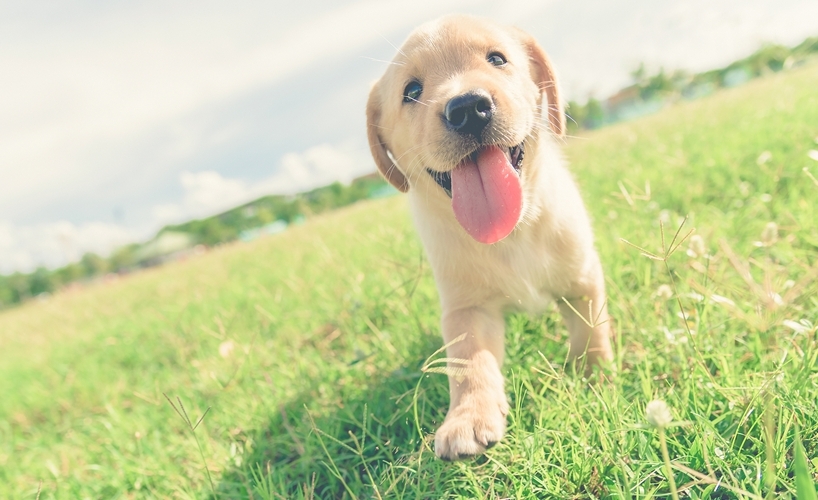
April 2nd, 2020 by
When you bring home your new puppy – for the first few days, weeks, and maybe even months – you may be wondering what on earth you’ve let yourself into! Undeniably cute, puppies can also be little monsters if they aren’t trained properly. It’s important to start training as soon as you bring your new family member home as this will set them up to be the companion you want them to be!
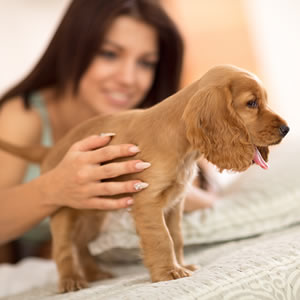 Be Consistent from the beginning
Be Consistent from the beginning
Think about what you want from your dog when it is fully grown. Setting good boundaries when your dog is young will help them to know what you want from them. For example, if you don’t want your fully grown dog to jump on the furniture, then don’t allow them to do so when they are small. Teaching your pup the rules from a young age avoids any confusion as they get older.
Be patient
Rome wasn’t built in a day! Don’t expect too much too quickly from your puppy. Your house and the big wide world are a new experience for them and this can often make them feel a little overwhelmed. Although it is important to begin training straight away, it is also important that you allow them time to settle in and adjust.
Give your dog their own space
Whether this is a crate, a pen or a certain area of the house. Dogs like to have their own space that they can retreat to when they want to rest or when they are feeling anxious or scared. You want this space to be positive for your pup – feed them there and praise them when they go in of their own accord. This helps them to know it is their very own safe space!
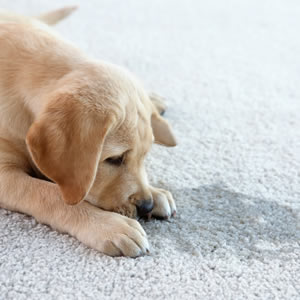 Toilet training
Toilet training
A dog’s safe space can be used to help with toilet training. If you choose to use a crate this is ideal – puppies are not likely to mess in their beds and will often hold it as long as they can. Every time puppy wakes up, finishes eating, or even looks remotely like they need to toilet; take them outside! The easiest way to toilet train a pup is to take them out for regular toilet breaks, every 20-30 minutes when you first bring them home and give them overenthusiastic praise when they do something outside! If they do have an accident inside don’t punish them. Simply remove them to the garden immediately and they should pick up what you are asking of them quite quickly.
Reward the good – Ignore the bad
Praise your puppy whenever they do something that you want them to do and ignore them when they do something they shouldn’t. Over excitable pups love jumping up at you for attention, and while this may seem cute when they are tiny – it can be a huge headache when your dog is fully grown. It is a common problem in dogs however easy to fix if you start as you mean to go on. If your dog jumps up at you for a fuss, ignore them. Only praise them and fuss when all four paws are back on the floor! Your puppy should pick this up quickly because they hate being ignored!
Early Socialisation
It’s important to properly socialise your new puppy when they are young to get them used to the outside world and all the new smells, sounds and experiences that come with it. Take your puppy to shops, pubs, on the bus, on the train, anywhere that you want your pup to be comfortable with going as they get older. Let them see the world – but don’t flood them. This is a mistake a lot of people make when they are socialising their new puppy. Flooding is when you expose your dog to an experience but don’t show them it is positive. An example of this would be forcing your dog to walk down a busy road when it is not used to the loud noises of traffic. A way to make this experience positive would be to sit at the side of the road with your puppy and let them sniff, look, and enjoy plenty of treats!
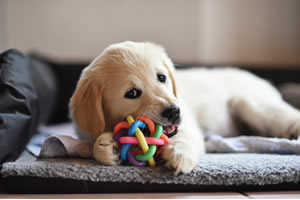 Chewing
Chewing
Those little needle teeth can be painful! Pups like to explore the world with their mouth so don’t think you’ll get away with not being used as a chew toy! A lot of puppies simply grow out of mouthing and biting, but this can be trained out of them earlier with redirection. Every time your pup tries to bite or mouth you, give them something that you actually want them to chew, such as a toy or a dog chew.
Practice recall early
Dogs are more likely to have good recall if you start training early. This can be done in the house to start with! Once your dog learns their name, entice them to you with a tasty treat, say your dog’s name followed by ‘Come!’ in a high-pitched tone and reward them when they come to you! When pup has picked this up, try it when they are distracted by something else. Keep practising with harder to resist distractions for a foolproof recall!
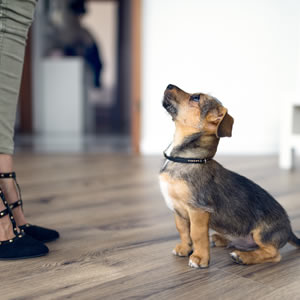 Mental Stimulation
Mental Stimulation
Mental stimulation is just as important as physical exercise – if not more so – for dogs of all ages, but especially puppies. Medium and large breed dogs develop more slowly than smaller breeds so too much exercise at a young age is a big no-no as this can cause big problems later on in life – such as hip and elbow dysplasia. An easy way to tire out your hyperactive puppy is with mental stimulation. Short training sessions are a good way mentally exhaust your puppy, and there are hundreds of games you can play with your dog to tire them out! Hide and seek around the house, practice down stays, hide treats around the garden and let your dog sniff them out. Games such as this mean your dog has to use his brain to think – and we all know how exhausting that can be!
Hopefully, these few tips will help you on your journey to having a well-behaved doggy! Make sure to keep training sessions short and sweet – puppies have a short attention span so don’t let them get bored as this may lead to frustration. Stay patient with puppy but most importantly have fun and enjoy the experience you share with your new best friend!
Comments
Leave a reply
Your e-mail address will not be published. All fields are required


